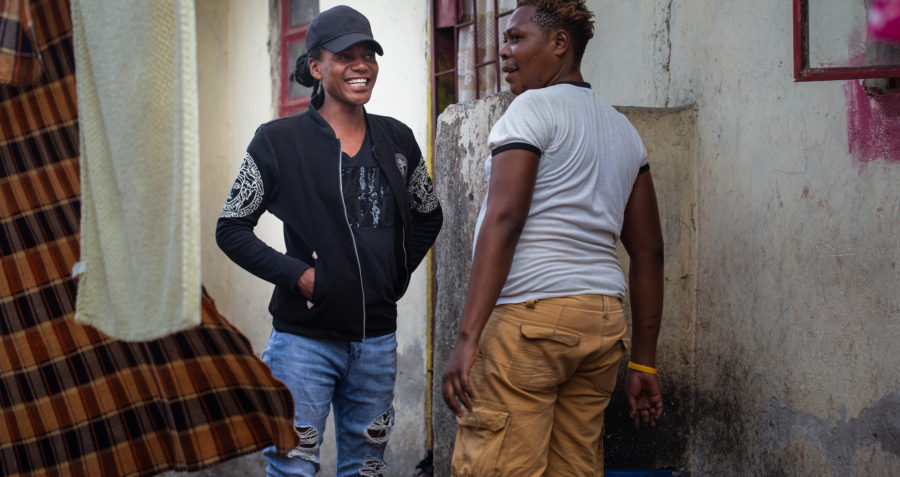More power and equality to communities most affected by HIV and AIDS
 © Frontline AIDS/Tony Kawimbe/Arete/2020
© Frontline AIDS/Tony Kawimbe/Arete/2020
The new UNAIDS strategy puts forward a bold and transformational approach for addressing the inequalities that stand in the way of ending AIDS.
At a special session of the UNAIDS Programme Coordinating Board (PCB), the Global AIDS Strategy 2021-2026 has now been adopted. Frontline AIDS, along with a number of our partners, are pleased to endorse it.
Our contributions to the Strategy
The Frontline AIDS partnership began our engagement with the strategy’s development process last summer, when we convened focus group discussions attended by more than 70 representatives of grassroots, national and global organisations.
Some of the messages that we heard in those discussions focused on:
- Ending the crisis in HIV prevention, ensuring ambitious targets on support for community-led responses.
- The need for higher priority and increased investment in innovation, particularly around social enablers
- Championing approaches which address gender inequality and gender-based violence as the key barrier to women’s access to prevention and treatment services.
At the PCB meeting, along with fourteen partners[1], we endorsed the new Global AIDS Strategy, as we believe it boldly addresses many of these issues. We thank the organisations who took part in focus groups for their participation, joint strategy endorsement and for the courage that they show every day in their work on the frontline of the HIV response.
An invaluable opportunity
We welcome the strategy’s central focus on inequalities. We also welcome its strong focus on HIV prevention, adolescents, young people and community-led responses; as well as addressing the criminalisation of marginalised groups affected by HIV, gender-based violence and human rights violations.
The strategic framework inspires all of us to question the status quo and work via ‘a whole-of-government and whole-of society’ approach to tackle the deep-rooted inequalities towards the groups most affected by HIV and AIDS. This is critical now more than ever, in a time when COVID-19 threatens to undermine all that we have achieved on HIV.
The Strategy’s approach is trailblazing because it promises a tectonic shift towards a more effective response to HIV and AIDS – addressing the ‘elephant in the room’ of the complex inequalities that drive HIV. This should inspire and give confidence and hope to people, particularly those with the least power in our own societies, that change is possible.
If we work together, this strategy could finally set us on a course to ending AIDS.
A hard-won consensus
It is heartening that UNAIDS PCB members adopted the Global AIDS Strategy 2021-2026 via such a strong consensus. This sends a strong message to the world that political courage and global solidarity are urgently needed to address the drivers of HIV and AIDS, such as inequalities, criminalisation of the key populations, lack of access to comprehensive sexuality education and gender-based violence.
It was inspiring to witness the leadership, full commitment and determination displayed among PCB members. Discussions at the meeting also highlighted that ‘social and moral values’ can never be used as a shorthand for valuing some lives less than others. The process towards consensus was complex and some governments went further than others to get all members of the PCB on board with the consensus around the strategy. We salute the efforts of these governments.
The road ahead
In our focus groups ahead of the PCB, many participants also called for a bolder and more clearly articulated role for UNAIDS in working with civil society to push for progress on the issues that are hardest to address – criminalisation of key populations, harmful gender norms, comprehensive sexuality education and harm reduction. Under the new Global AIDS Strategy, we hope to see strong civil society engagement in the development of the new Unified Budget, Results and Accountability Framework (UBRAF) to shape this ambitious new role.
We also look forward to working with UNAIDS and all PCB members to ensure that the brave commitments in the new strategy are firmly reflected in the upcoming High Level Meeting on AIDS and its political declaration.
- Alive Medical Services, Uganda
- ATHENA Network
- APCASO
- Coalition Plus / Kimirina, Ecuador
- Colectivo Amigos Contro el Sida (CAS), Guatemala
- Development Agenda for Girls and Women in Africa Network
- Drug Free and Preventive Healthcare Organization (DAPHO), Nigeria
- Drug Harm Reduction Advocacy Network (DHRAN), Nigeria
- GayLatino
- Girls Not Brides: The Global Partnership to End Child Marriage
- India HIV/AIDS Alliance
- Instituto para el Desarrollo Humano, Bolivia
- People Against Suffering, Oppression and Poverty, South Africa
- SOMOSGAY, Paraguay
Tags
UNAIDS


